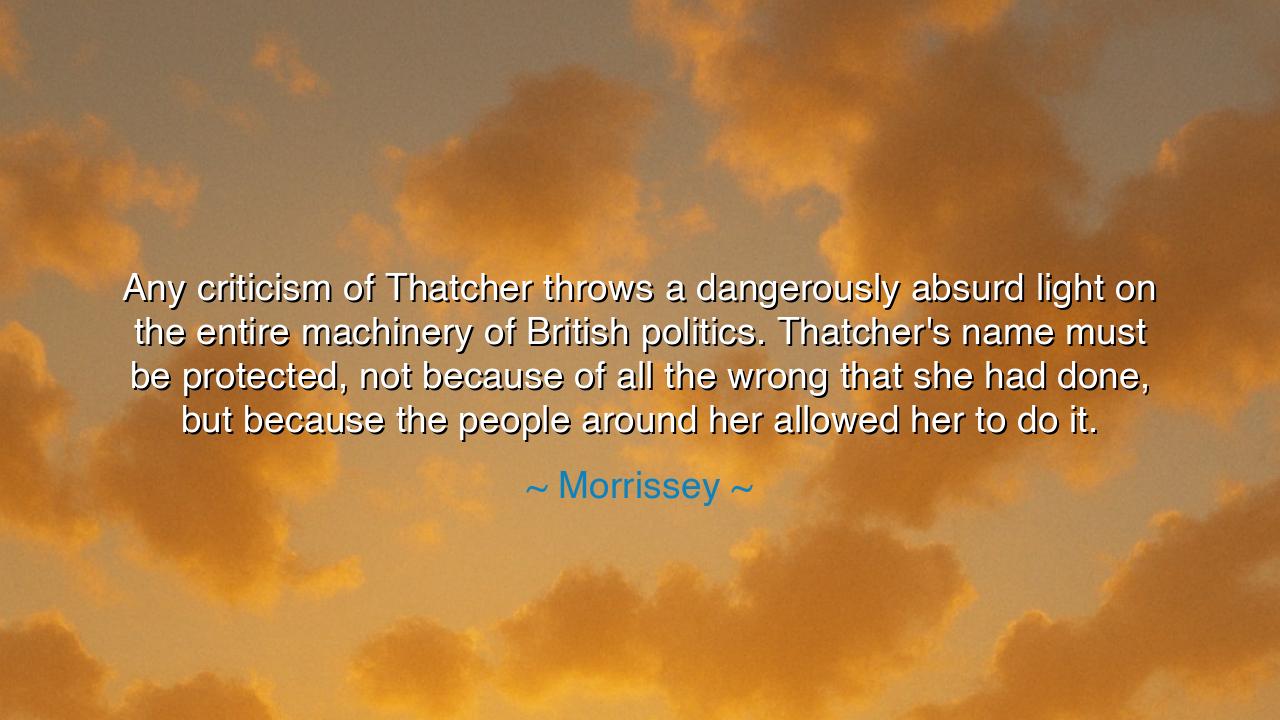
Any criticism of Thatcher throws a dangerously absurd light on
Any criticism of Thatcher throws a dangerously absurd light on the entire machinery of British politics. Thatcher's name must be protected, not because of all the wrong that she had done, but because the people around her allowed her to do it.






"Any criticism of Thatcher throws a dangerously absurd light on the entire machinery of British politics. Thatcher’s name must be protected, not because of all the wrong she had done, but because the people around her allowed her to do it." Thus spoke Morrissey, the singer whose words, though lyrical, cut with the sharpness of prophecy. In these lines he reminds us that the sins of a ruler are never hers alone—they are woven from the silence, complicity, and surrender of those who surround her. To blame only the leader is to forget the machinery that upheld her.
The ancients understood this bitter truth. When tyrants rose in Greece and Rome, it was not their will alone that established power, but the consent of senators, soldiers, and citizens who bent their backs in submission. Nero’s flames consumed Rome not because one man struck a match, but because an empire allowed him to rule unchecked. Thus, to criticize the tyrant is also to reveal the corruption of the system that enabled her reign.
Margaret Thatcher’s name, in Morrissey’s words, stands as symbol. She may have wielded policies that divided, hardened, or wounded, but her power did not spring from the void. Parliament, party, and people around her allowed her course, either through loyalty, fear, or gain. To pierce her legacy with criticism is, therefore, to expose not only her deeds, but the broader decay of a structure that permitted them.
History offers another mirror in Adolf Hitler. Though his name alone is reviled, he rose not by his will alone but because men in suits, citizens in crowds, and generals in uniform chose to stand beside him—or chose silence when they should have resisted. His protection was not his own making, but the collective guilt of those who enabled him. Morrissey warns that Thatcher, though far different in scope, must be seen through the same lens: not alone, but as the product of a political body that bore equal responsibility.
Therefore, let this lesson endure: never shield a leader by separating her from those who upheld her. Politics is not the craft of one, but the will of many. If wrongs are done, they belong not only to the head but to the hands that carried them, the tongues that excused them, and the hearts that refused to resist. To protect the name of the leader is to protect the guilty machinery itself. True wisdom demands we hold all accountable, lest history repeat its endless cycle of power and submission.






NPNhung Pham
Personally, I want a way to hold ambivalence without becoming numb. How do I keep space for the real harms associated with an era while acknowledging motives, constraints, and mixed outcomes? Please suggest a reflective practice: a two-column journal (policy impact vs. narrative), questions to ask elders who lived through it, and a reading plan that includes both critical and sympathetic accounts. I’m not chasing perfect neutrality; I’m after a stance that can mourn, critique, and learn without erasing complexity.
TDNghiem Thi Thuy Duong
Swapping Westminster for workplaces, I see a cautionary parallel: harmful outcomes often persist because lieutenants cushion the leader from feedback, and supporters treat criticism as disloyalty to the mission. What countermeasures actually bite—independent review committees, protected dissent channels, rotation of gatekeepers, transparent decision logs? Could you outline a minimal set of safeguards that any large organization should adopt to prevent personality cults from capturing governance, along with a quick diagnostic to detect when reverence has begun to eclipse accountability?
DBanh duong bui
There’s also the role of artists who intervene in political memory. When a musician or novelist makes a blistering claim, I’m torn between appreciating truth-telling and worrying about myth-making in a different direction. How can I evaluate such cultural critiques responsibly? Maybe a method: separate verifiable assertions from metaphor, compare with contemporaneous sources, and ask whether the argument scales beyond a single personality. What questions stop me from treating a lyric as a ledger, while still letting art sharpen my moral sensitivity?
BBBinh Bui
I’m interested in the conversational move where critique of a leader is framed as an attack on the polity itself. That fusion shuts down accountability by labeling dissent as betrayal. What language helps keep the channels open? I’d love some practical scripts: “I respect the office, I dispute this decision because…,” “Here’s the measurable harm and the standard it violates,” “What would falsify my claim?” Also, any norms a healthy democracy should cultivate—steel-manning opponents, time-limited immunity for grieving, and clear lines between reverence and silence.
TDNgo Tien Dat
The suggestion that a name “must be protected” makes me think about memory politics: how nations launder reputations to preserve institutional legitimacy. As a media consumer, how do I read official memorials, school curricula, or state ceremonies without getting trapped in hagiography or spite? Could you offer a short heuristic for engaging contested legacies—identify who curates the narrative, list missing voices, distinguish grief from praise, and check policy outcomes against rhetoric—so we neither sanctify nor caricature, but assess with proportion?